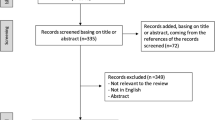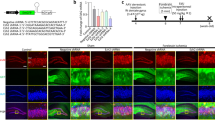Abstract
Pyruvate Kinase isozymes M2 (PKM2) is a glycolytic enzyme involved in glycolysis that decarboxylates phosphoenolpyruvate to pyruvate and generates ATP. PKM2 also plays a significant role in tumor growth, in cell division, angiogenesis, apoptosis and metastasis. In this study, we have investigated the role of PKM2 in cortical neurons which suffered hypoxic-ischemic encephalopathy (HIE) in newborn rats. Immunohistochemistry and Western blot analysis revealed the protein expression of PKM2 peaking at 24 h after HIE. Double immunofluorescence labeling showed that PKM2 was mainly located in the neurons of the ipsilateral cerebral cortex, not in astrocytes or microglia. The increased level of active caspase-3 and the decreased level of phosphorylated AKT (p-AKT) were consistent with the PKM2 expression. TUNEL staining assay showed that PKM2 may participate in neuronal apoptosis in the rat ipsilateral cerebral cortex. Silencing of PKM2 in primary cultures of cortical neurons using a specific siRNA reduced the expression of active caspase-3 and upregulated p-AKT expression. Taken together, the results indicate that PKM2 may be involved in neuronal apoptosis after HIE by a mechanism dependent on the inactivation of p-AKT.







Similar content being viewed by others
References
Charriaut-Marlangue C, Nguyen T, Bonnin P, Duy A, Leger P, Csaba Z, Pansiot J, Bourgeois T, Renolleau S, Baud O (2014) Sildenafil mediates blood-flow redistribution and neuroprotection after neonatal hypoxia-ischemia. Stroke 45:850–856
Threlkeld S, Lim Y, La Rue M, Gaudet C, Stonestreet B (2017) Immuno-modulator inter-alpha inhibitor proteins ameliorate complex auditory processing deficits in rats with neonatal hypoxic-ischemic brain injury. Brain Behav Immun 64:173–179
Lai M, Yang S (2011) Perinatal hypoxic-ischemic encephalopathy. J Biomed Biotechnol 2011:609813
Levene M, Kornberg J, Williams T (1985) The incidence and severity of post-asphyxial encephalopathy in full-term infants. Early Hum Dev 11:21–26
Cerio F, Lara-Celador I, Alvarez A, Hilario E (2013) Neuroprotective therapies after perinatal hypoxic-ischemic brain injury. Brain Sci 3:191–214
Huang B, Castillo M (2008) Hypoxic-ischemic brain injury: imaging findings from birth to adulthood. Radiographics 28:417–439. (quiz 617)
Martinez-Biarge M, Diez-Sebastian J, Kapellou O, Gindner D, Allsop J, Rutherford M, Cowan F (2011) Predicting motor outcome and death in term hypoxic-ischemic encephalopathy. Neurology 76:2055–2061
Douglas-Escobar M, Weiss M (2015) Hypoxic-ischemic encephalopathy: a review for the clinician. JAMA Pediatr 169:397–403
Lorek A, Takei Y, Cady E, Wyatt J, Penrice J, Edwards A, Peebles D, Wylezinska M, Owen-Reece H, Kirkbride V (1994) Delayed (“secondary”) cerebral energy failure after acute hypoxia-ischemia in the newborn piglet: continuous 48-hour studies by phosphorus magnetic resonance spectroscopy. Pediatr Res 36:699–706
Vannucci R, Towfighi J, Vannucci S (2004) Secondary energy failure after cerebral hypoxia-ischemia in the immature rat. J Cereb Blood Flow Metab 24:1090–1097
Han B, DeMattos R, Dugan L, Kim-Han J, Brendza R, Fryer J, Kierson M, Cirrito J, Quick K, Harmony J, Aronow B, Holtzman D (2001) Clusterin contributes to caspase-3-independent brain injury following neonatal hypoxia-ischemia. Nat Med 7:338–343
Li Q, Li H, Roughton K, Wang X, Kroemer G, Blomgren K, Zhu C (2010) Lithium reduces apoptosis and autophagy after neonatal hypoxia-ischemia. Cell Death Dis 1:e56
Ma Q, Dasgupta C, Li Y, Bajwa N, Xiong F, Harding B, Hartman R, Zhang L (2016) Inhibition of microRNA-210 provides neuroprotection in hypoxic-ischemic brain injury in neonatal rats. Neurobiol Dis 89:202–212
Xu N, Zhang Y, Doycheva D, Ding Y, Zhang Y, Tang J, Guo H, Zhang J (2018) Adiponectin attenuates neuronal apoptosis induced by hypoxia-ischemia via the activation of AdipoR1/APPL1/LKB1/AMPK pathway in neonatal rats. Neuropharmacology 133:415–428
Tsutsumi H, Tani K, Fujii H, Miwa S (1988) Expression of L- and M-type pyruvate kinase in human tissues. Genomics 2:86–89
Williams A, Khadka V, Tang M, Avelar A, Schunke K, Menor M, Shohet R (2018) HIF1 mediates a switch in pyruvate kinase isoforms after myocardial infarction. Physiol Genom. https://doi.org/10.1152/physiolgenomics.00130.2017
Clower C, Chatterjee D, Wang Z, Cantley L, Vander Heiden M, Krainer A (2010) The alternative splicing repressors hnRNP A1/A2 and PTB influence pyruvate kinase isoform expression and cell metabolism. Proc Natl Acad Sci USA 107:1894–1899
Mazurek S (2011) Pyruvate kinase type M2: a key regulator of the metabolic budget system in tumor cells. Int J Biochem Cell Biol 43:969–980
Mazurek S, Boschek C, Hugo F, Eigenbrodt E (2005) Pyruvate kinase type M2 and its role in tumor growth and spreading. Semin Cancer Biol 15:300–308
Noguchi T, Yamada K, Inoue H, Matsuda T, Tanaka T (1987) The L- and R-type isozymes of rat pyruvate kinase are produced from a single gene by use of different promoters. J Biol Chem 262:14366–14371
Christofk H, Vander Heiden M, Harris M, Ramanathan A, Gerszten R, Wei R, Fleming M, Schreiber S, Cantley L (2008) The M2 splice isoform of pyruvate kinase is important for cancer metabolism and tumour growth. Nature 452:230–233
Lee J, Kim H, Han Y, Kim J (2008) Pyruvate kinase isozyme type M2 (PKM2) interacts and cooperates with Oct-4 in regulating transcription. Int J Biochem Cell Biol 40:1043–1054
Cairns R, Harris I, Mak T (2011) Regulation of cancer cell metabolism. Nat Rev Cancer 11:85–95
Tech K, Tikunov AP, Farooq H, Morrissy AS, Meidinger J, Fish T, Green SC, Liu H, Li Y, Mungall AJ, Moore RA (2017) Pyruvate kinase inhibits proliferation during postnatal cerebellar neurogenesis and suppresses medulloblastoma formation. Cancer Res 77:3217–3230
Steták A, Veress R, Ovádi J, Csermely P, Kéri G, Ullrich A (2007) Nuclear translocation of the tumor marker pyruvate kinase M2 induces programmed cell death. Cancer Res 67:1602–1608
Dixon B, Reis C, Ho W, Tang J, Zhang J (2015) Neuroprotective strategies after neonatal hypoxic ischemic encephalopathy. Int J Mol Sci 16:22368–22401
Qin X, Du Y, Chen X, Li W, Zhang J, Yang J (2014) Activation of Akt protects cancer cells from growth inhibition induced by PKM2 knockdown. Cell Biosci 4:20
Cai J, Kang Z, Liu W, Luo X, Qiang S, Zhang J, Ohta S, Sun X, Xu W, Tao H, Li R (2008) Hydrogen therapy reduces apoptosis in neonatal hypoxia-ischemia rat model. Neurosci Lett 441:167–172
Ma D, Hossain M, Chow A, Arshad M, Battson R, Sanders R, Mehmet H, Edwards A, Franks N, Maze M (2005) Xenon and hypothermia combine to provide neuroprotection from neonatal asphyxia. Ann Neurol 58:182–193
Rice JE, Vannucci RC, Brierley JB (1981) The influence of immaturity on hypoxic-ischemic brain damage in the rat. Ann Neurol 9:131–141
Li B, Concepcion K, Meng X, Zhang L (2017) Brain-immune interactions in perinatal hypoxic-ischemic brain injury. Prog Neurobiol 159:50–68
Sun Q, Chen X, Ma J, Peng H, Wang F, Zha X, Wang Y, Jing Y, Yang H, Chen R, Chang L, Zhang Y, Goto J, Onda H, Chen T, Wang M, Lu Y, You H, Kwiatkowski D, Zhang H (2011) Mammalian target of rapamycin up-regulation of pyruvate kinase isoenzyme type M2 is critical for aerobic glycolysis and tumor growth. Proc Natl Acad Sci USA 108:4129–4134
Kanda R, Kawahara A, Watari K, Murakami Y, Sonoda K, Maeda M, Fujita H, Kage M, Uramoto H, Costa C, Kuwano M, Ono M (2013) Erlotinib resistance in lung cancer cells mediated by integrin β1/Src/Akt-driven bypass signaling. Cancer Res 73:6243–6253
Wang C, Jiang J, Ji J, Cai Q, Chen X, Yu Y, Zhu Z, Zhang J (2017) PKM2 promotes cell migration and inhibits autophagy by mediating PI3K/AKT activation and contributes to the malignant development of gastric cancer. Sci Rep 7:2886
Garnett M, Dyson R, Dost F (1974) Pyruvate kinase isozyme changes in parenchymal cells of regenerating rat liver. J Biol Chem 249:5222–5226
He X, Du S, Lei T, Li X, Liu Y, Wang H, Tong R, Wang Y (2017) PKM2 in carcinogenesis and oncotherapy. Oncotarget 8:110656–110670
Dayton T, Gocheva V, Miller K, Israelsen W, Bhutkar A, Clish C, Davidson S, Luengo A, Bronson R, Jacks T, Vander Heiden M (2016) Germline loss of PKM2 promotes metabolic distress and hepatocellular carcinoma. Genes Dev 30:1020–1033
David C, Manley J (2010) Alternative pre-mRNA splicing regulation in cancer: pathways and programs unhinged. Genes Dev 24:2343–2364
Gao X, Wang H, Yang JJ, Liu X, Liu ZR (2012) Pyruvate kinase M2 regulates gene transcription by acting as a protein kinase. Mol cell 45:598–609
Lunt SY, Vander Heiden MG (2011) Aerobic glycolysis: meeting the metabolic requirements of cell proliferation. Annu Rev Cell Dev Biol 27:441–464
Kwon O, Kang T, Kim J, Kim M, Noh S, Song K, Yoo H, Kim W, Xie Z, Pocalyko D, Kim S, Kim Y (2012) Pyruvate kinase M2 promotes the growth of gastric cancer cells via regulation of Bcl-xL expression at transcriptional level. Biochem Biophys Res Commun 423:38–44
Cheon JH, Kim SY, Son JY, Kang YR, An JH, Kwon JH, Song HS, Moon A, Lee BM, Kim HS (2016) Pyruvate kinase M2: a novel biomarker for the early detection of acute Kidney injury. Toxicol Res 32:47–56
Author information
Authors and Affiliations
Corresponding author
Additional information
Publisher’s Note
Springer Nature remains neutral with regard to jurisdictional claims in published maps and institutional affiliations.
Rights and permissions
About this article
Cite this article
Wu, Q., Ge, W., Chen, Y. et al. PKM2 Involved in Neuronal Apoptosis on Hypoxic-ischemic Encephalopathy in Neonatal Rats. Neurochem Res 44, 1602–1612 (2019). https://doi.org/10.1007/s11064-019-02784-7
Received:
Revised:
Accepted:
Published:
Issue Date:
DOI: https://doi.org/10.1007/s11064-019-02784-7




